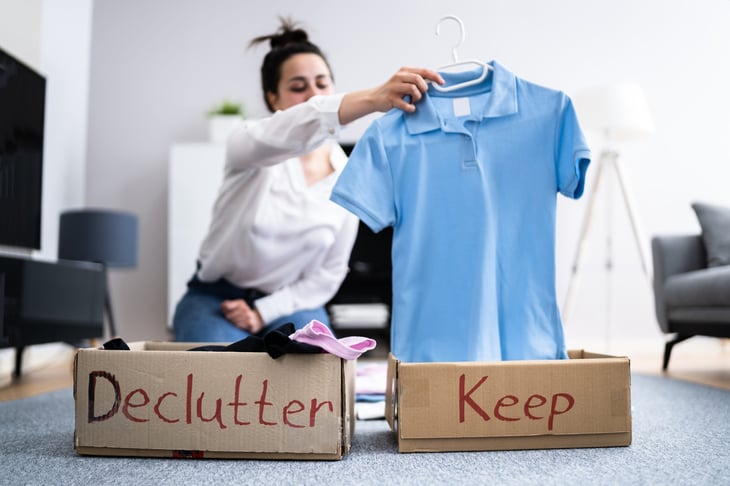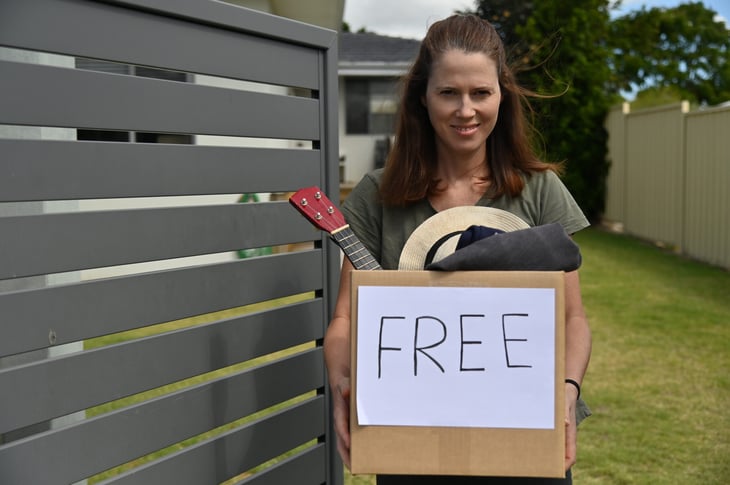
Editor's Note: This story originally appeared on Living on the Cheap.
Learn how to sell items on the Facebook marketplace to earn extra cash! You can easily declutter, and make some quick cash in the process.
These tips are great for online selling — and are fast, simple, and easy to do. Be sure to read through our selling tips so that you can earn quickly and stay safe.
When is the best time to list items online to sell?

The first few months of the year are a perfect time to get your house in order and declutter.
It’s often cold or dark outside, so you’re stuck in the house anyway; you have Christmas gifts to put away; you’re ready to start on your New Year’s resolution to get better organized; and spring cleaning is just around the corner.
When decluttering, it can be hard to decide to do with the stuff that you don’t need, but that is still worth something.
You can hang onto stuff until you can have a garage sale, but how many months from now will that be (and will you actually do it)? You can sell on Craigslist, but it’s hard to make arrangements with a stranger.
Should I donate instead?

You can donate the items to a nonprofit and take a tax deduction, but if you choose to take the standard deduction, you can’t claim the donation.
Higher-value items may be worth way more than the donation value guide allows, and you still have to arrange to drop them off and get a receipt.
Or you can turn to a Facebook buy/sell group to get rid of your stuff.
How to find buy/sell groups on Facebook

Local buy/sell groups have become so prevalent on Facebook. The groups are usually defined by a certain geographic area — from small suburbs to big cities or entire counties. The rules and regulations vary by group, as they can be created and administrated by anyone who chooses to start one.
These groups are only viewable by members, and membership requirements are up to individual administrators. Some groups require proof (via your Facebook profile) that you live or work in, or have ties to, that particular area, or that you are Facebook friends with other group members.
Other groups are simply a more localized version of Craigslist. To find local buy/sell groups in your area, type a few keywords into the Facebook search bar at the top, such as “buy and sell” plus the name of your location.
You can also search “resale” or “local to” plus your location, or just type in the name of your local area and scroll through the list for any resale pages. There are probably close to 20 resale groups in the closest suburbs to my neighborhood.
Benefits of buy/sell groups

- They aren’t completely anonymous like Craigslist since each user is tied to his or her profile. While anyone can create a fake profile, it won’t take long for someone in the group to report any misdoings (see the following safety measures). You can see a person’s profile, and even if it’s set to private, some information is viewable, including whether you have any mutual friends. Knowing that a buyer or seller is a friend of your friend feels more legitimate.
- If you have an issue, the group administrator should help you resolve it and can decide whether to ban someone from the group if it’s a major or constant issue.
- You can sell your items closer to their value — especially for new or like-new items — than you’d get from a resale or consignment store, which has to take a portion to cover overhead.
- They feel more like a community — you may get to know the frequent sellers or buyers, and even make some friends. Several groups that I’m part of will organize group activities or group sales in a community space.
- Some groups are targeted to your specific needs: clothing only, no clothing allowed, maternity and/or baby items, kids’ clothes, etc., so you don’t have to wade through thousands of listings in which you aren’t interested.
- Pickups are usually limited to the locally defined area, so you won’t have to travel across the city to meet a buyer or seller.
Here are tips for buying and selling on Facebook.
1. Know the rules

- Read the rules and lingo of each group and follow them. People get angry when the rules are broken and you risk being kicked out of the group or shamed by other members on the forum. Every group has different rules, but they are important to follow.
- If you’re looking for something in particular, post an ISO (in search of) message — chances are, someone will want to get rid of what you are looking for, and it’ll save you time in your search.
2. Price and list items fairly

- Price your items fairly. People will scroll past items that are too expensive. Any dollar you make is more than you would have made if you donated or threw the item away, so don’t be greedy. Pricing low will give you a better chance of selling your items, and something is better than nothing. A few dollars aren’t worth something sitting in a box or hanging in your closet.
- Unless it’s new with tags, it needs to be priced as used. I don’t care if it’s only worn once or twice, it’s still used (and was probably actually worn 5-6 times if you’re being honest). You’ll find that “worn once or twice” is the default description, and often it’ll be clear that it’s not true.
- List sizes, dimensions, condition and anything else you anticipate people will want to ask. It’ll save lots of time compared to going back and forth in comments or messages.
- Expect some haggling. Even if you’ve priced fairly, you can expect that someone will offer lower. If no one else is interested in buying, consider the lower price.
3. Be honest

- Be completely honest in your listings. If there are any flaws, disclose them and include a picture. Be honest about fading/spots/condition, because the buyer isn’t committed to purchasing until they examine the item — you’ll waste everyone’s time by not being honest, and people will remember and not buy from you again.
- Remember that you’re selling stuff you don’t want. If no one is buying, it’s either overpriced or it’s junk that no one wants. Lower the price, donate it or throw it away.
4. Be a smart buyer

- Be a good buyer. Show up on time and have exact change when you are purchasing — or overpay and don’t expect change from the seller.
- Don’t make a claim for items you aren’t completely sure you want to purchase. People will respond that they are interested in an item in order to “hold their spot” while they think about it, and then not get back to the seller quickly, while others are waiting as backup buyers. It’s not fair to anyone. It’s similar to filling up your grocery cart, changing your mind and walking out of the store, abandoning your cart.
- Check the item very closely before exchanging money — don’t be afraid to change your mind if it isn’t what you expected — especially if the buyer misrepresented the item. Just a simple “No thanks, it isn’t what I expected” should suffice.
5. Watch your reputation

Be kind and honest. If you are rude, if you lie about the condition of items, if you constantly haggle with prices, if you don’t show up for pick-ups or if you don’t leave the correct amount of money, you’ll have a bad reputation.
People will complain about you, block you from seeing their posts, or ask that you be kicked out of the group.
Plus, remember these are people in your community — someone may end up being the parent of your child’s friend, teacher or someone that you’ll have to see on a regular basis.
6. Be safe

- Meet in a public place, unless you know the person. Many people will ask that you pick up purchases at their home or offer porch pick-up if they aren’t going to be home and designate somewhere for you to leave the money, rather than trying to schedule a public meeting. This can be risky. The risks range from getting into a dangerous situation, to someone taking your item without leaving money, or taking the money that was left by another buyer.
- Don’t post your address, phone number or schedule/detail your availability in the post or comments — all of these private details should be exchanged via private message with only the buyer or seller, especially if you are arranging porch pick-up or meeting at a home.
- Tell someone where and when you are meeting with a buyer.
- Save your messages/emails until the transaction is complete in case there is an issue.
- Accept and pay with cash only (and know what to look for with counterfeit money). PayPal is a safe alternative if you are familiar with a person.
Do what works best for you

Personally, I’m more a fan of donating items than selling, since posting and arranging for pick-ups for small value items can be time-consuming. Occasionally I’ll sell high-demand items or will respond to ISO posts if I have an item someone wants, knowing that these will be quick sales.
I use the buy/sell groups a lot for purchases, as I have no qualms about purchasing certain things secondhand.
I bought most of my son’s infant wardrobe from these groups and rarely paid more than $1 per item — and often much less when buying a bag or box of stuff from one seller. Since babies grow fast and often don’t wear items more than a few times, I was able to buy a lot of excellent, like-new condition items for very little money.
Buy/sell groups are worth joining if you don’t mind secondhand purchases and would rather shop online than at a thrift store. They are a great option for selling items, especially if you have high-demand, excellent-condition or name-brand items to sell.





Add a Comment
Our Policy: We welcome relevant and respectful comments in order to foster healthy and informative discussions. All other comments may be removed. Comments with links are automatically held for moderation.